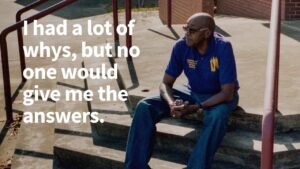
In a silent room on the second story of an old slave warehouse in Montgomery, Alabama sits hundreds of jars filled with dirt and clay. Each is labeled with – if possible – a name, birth date and day of death, and contains soil from the burial sites of African Americans who were unjustly killed during the Jim Crow Era. But for James Johnson, it means much more.
Johnson’s cousin, Wes Johnson, was shot and lynched in Abbeville, AL in 1937 for allegedly raping a white woman. Wes’ remains are now in one of those jars located at what is now the Equal Justice Initiative. The museum was founded by lawyer Bryan Stevenson that showcases lynching’s in America and the unjust incarceration of African Americans in US prisons.
Stevenson, who is the direct inspiration of the recent movie ‘Just Mercy’ invited Johnson to the grand opening of the museum, and that’s how Wes’ story began its rise in popularity. But Wes’ story hasn’t always been so popular, especially among the Johnson family.
“I remember the day my mother first told me about what had happened to Wes. I remember she was squeezing my hand pretty tight,” Johnson said.
“But after that, when I would ask questions about it, I wanted answers, and no one wanted to talk about it.”
Johnson soon grew older and spent time in Chicago, where he used this period to learn more about other people and races.
It wasn’t until Johnson came to Stevenson and the EJI that he found the transcripts of what really happened with Wes and the man who was responsible for his death.
“Wes was actually dating the girl, she was 18 years of age herself, and her husband caught them. The prosecuting attorney asked her if she had asked her husband not to kill Wes,” Johnson said.
“The husband’s attorney objected right then though, so he didn’t have to answer the question…but word was, she had begged him not to kill Wes.”
Since then, Johnson has gone on to interview with people like Oprah for a “60 Minutes” episode, and the Harvard Law School, championing for reform and the education instead of erasure of black history in America. He has continued to partner with the EJI as well in an effort to make sure that Wes’, story along with many others, don’t get forgotten.
Sonia Rosier, and educator from Abbeville, has taken a group of high school students on a field trip to the EJI to help them learn why the past must not be ignored.
“The EJI provides us with a true picture of American history that had not been presented in the past,” Rosier said. “It’s a safe space for all communities to have a true discussion about ‘equality for all’.”
Miracle Potter, a current FAMU Pharmacy student, was one of the students who got to attend this field trip her senior year of high school.
“The most impactful thing to me was the wall with the jars,” Potter said. “The wall was completely full, and it didn’t even represent half of the people that were hung.”
Though Johnson recognizes the reparations that have been done in the years since the horrific Jim Crow Era, he admits we still have a long way to go.
“It starts with leadership, especially among educators. Educators can’t be afraid of getting into those areas that might be uncomfortable to talk about,” Johnson said. “The youth of today are our tomorrow, and the change begins with the parents and the educators breaking those harmful thoughts and ideas that took root so long ago.”
You can see ‘Just Mercy’ starring Michael B. Jordan and Jamie Foxx in theaters everywhere now.